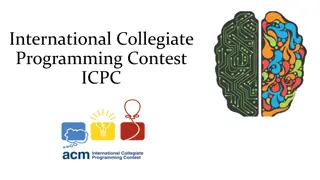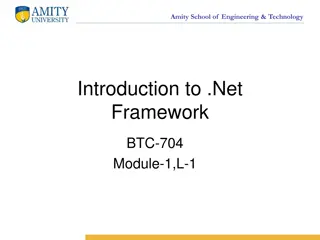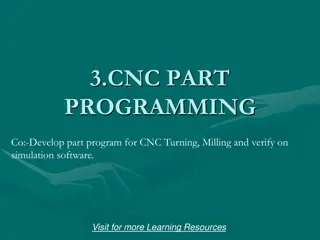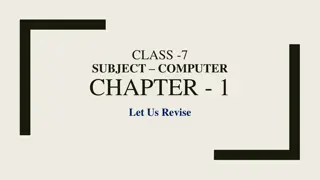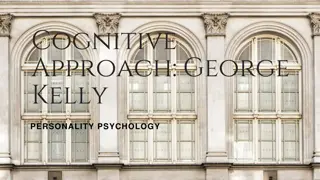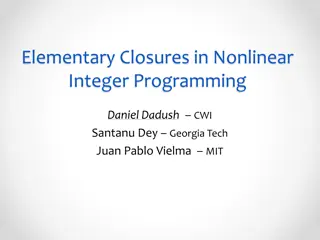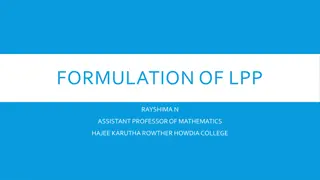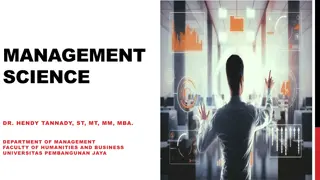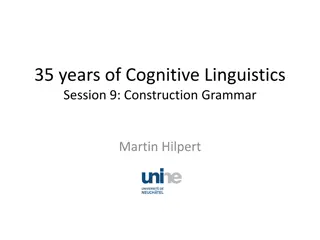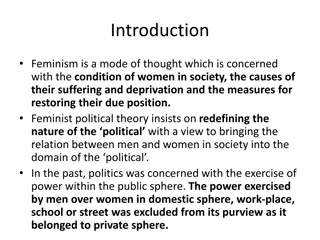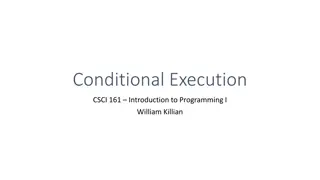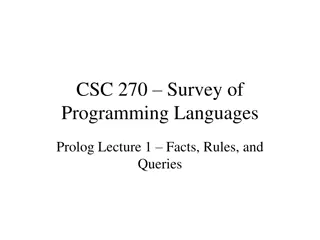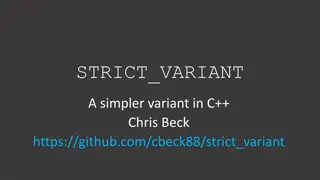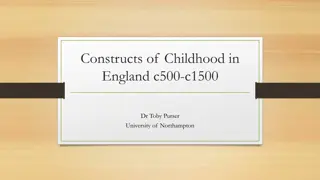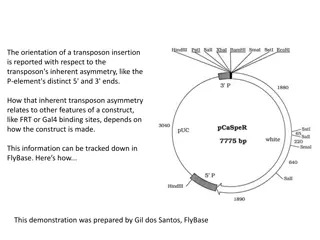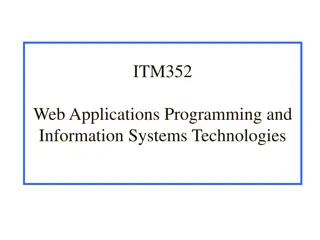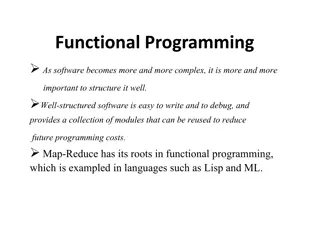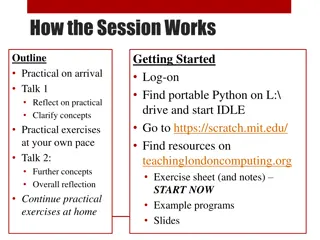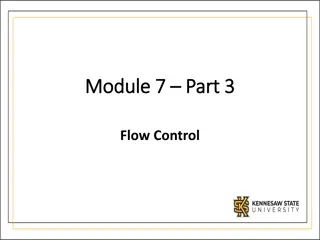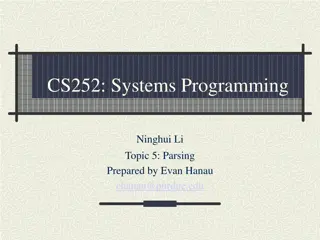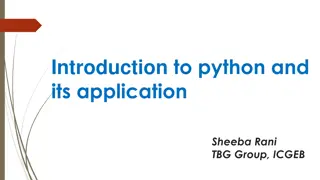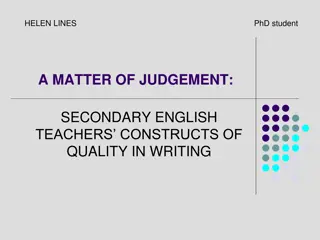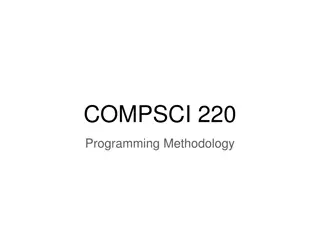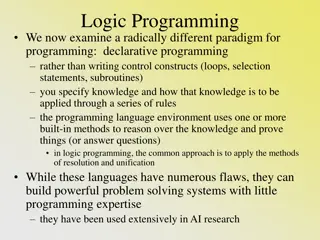Functional Programming
Functional programming, a paradigm that emphasizes declarative programming, pure functions, and limited side effects. Explore the benefits and characteristics of functional programming languages.
0 views • 20 slides
Programming in C: Overview and Constants Explanation
Programming in C is a fundamental introductory guide to the C programming language. It covers the basics of C, including its development history, character set, constants, and rules for constructing constants like integer and real constants. Dr. M. A. JAMAL MOHAMED YASEEN ZUBEIR, an Assistant Profes
4 views • 33 slides
International Collegiate Programming Contest (ICPC) Overview and Rules
The International Collegiate Programming Contest (ICPC) is a prestigious global competition in competitive programming supported by major tech companies like Google and Facebook. Participants tackle logical and mathematical problems by developing efficient algorithms and implementing them in various
5 views • 17 slides
Decision Analysis and Operations Research in Management
This content delves into Management Decision Analysis and Operations Research techniques such as Linear Programming, Integer Linear Programming, Dynamic Programming, Nonlinear Programming, and Network Programming. It covers the phases of an Operations Research study, mathematical modeling for decisi
0 views • 36 slides
Introduction to Amity School of Engineering & Technology
Amity School of Engineering & Technology offers courses in .NET Framework, Windows GUI development, C/C++ programming, Visual Basic, and Java/J2EE programming. The curriculum covers topics such as Win32 API, MFC, object-oriented programming, and web development. Students learn to develop application
1 views • 14 slides
Module 2: PSEA and Safe Programming Training of Trainers (ToT) by CRS HRD
This Module 2 focuses on PSEA and Safe Programming, covering key sessions on understanding safe programming, identifying protection and SEA risks, and mitigating risks. It emphasizes the importance of safe programming in increasing safety, dignity, and access, with staff playing a crucial role. Part
3 views • 19 slides
Comprehensive Guide to CNC Part Programming
Learn about CNC part programming for turning and milling machines. Understand the importance of part programs, program input devices, machine control unit functions, and CNC programming methods like offline and conversational programming. Explore the Cartesian coordinate system, tool positioning, an
0 views • 61 slides
Computer Programming: Basics and Beyond
In this chapter, we delve into the fundamental concepts of computer programming. We explore the definition of a program, the role of programming languages, types of programming languages, and generations of programming languages. Additionally, an assignment is provided to reinforce the key learnings
0 views • 25 slides
George Kelly's Personal Construct Theory in Personality Psychology
George Kelly's Personal Construct Theory explains how individuals perceive and organize their world by formulating and testing hypotheses, just like scientists. These personal constructs shape our unique views of events, influencing how we interpret reality and make decisions. Kelly's theory of cons
0 views • 23 slides
Gender Constructs in 'The Handmaid's Tale' and Society
Delve into the intricate themes of gender norms, sexuality, and social constructs in Margaret Atwood's novel "The Handmaid's Tale". Analyze key incidents, quotes, and characters to understand the portrayal of male and female roles. Reflect on how these concepts intertwine with societal expectations
0 views • 16 slides
Advances in Integer Linear Programming and Closure Techniques
Explore cutting planes, convex integer programming, Chvátal-Gomory cuts, and closure methods in nonlinear integer programming. Discover how these techniques enhance the efficiency and effectiveness of integer programming models, leading to substantial progress and improved solutions.
1 views • 40 slides
Object-Oriented Programming (OOP) in Python
Python is a versatile programming language that supports various programming approaches. Object-Oriented Programming (OOP) is a popular method in Python where objects are created to solve programming problems. OOP in Python focuses on creating reusable code, following the principle of DRY (Don't Rep
2 views • 35 slides
Formulation of Linear Programming Problems in Decision Making
Linear Programming is a mathematical technique used to optimize resource allocation and achieve specific objectives in decision-making. The nature of Linear Programming problems includes product-mix and blending problems, with components like decision variables and constraints. Various terminologies
1 views • 14 slides
Introduction to Computers and C++ Programming Lecture 1 - Overview and Basics
This lecture covers the fundamental concepts in computer systems and programming using C++. Topics include the main components of a computer, bytes and addresses in memory, computer systems hardware and software, understanding programs, programming languages, compilers, preparing and running C++ pro
2 views • 21 slides
Linear Programming: A Tool for Optimizing Business Operations
Explore the application of linear programming in business, as exemplified by the case study of San Miguel Corporation. Learn how linear programming models can help maximize profits, optimize resource allocation, and streamline decision-making processes in various industries. Discover the fundamental
1 views • 19 slides
Construction Grammar in Cognitive Linguistics Symposium
Delve into the realm of Construction Grammar with Martin Hilpert in the 35th year of Cognitive Linguistics. Discover the intricacies of idiomatic constructions, the distinction between constructions and constructs, coercion in neologisms, and more. Explore the relationship between Construction Gramm
1 views • 81 slides
Feminist Political Theory and Gender Constructs
Feminist political theory seeks to redefine politics by addressing the power dynamics between men and women. The distinction between sex and gender highlights how societal attitudes, influenced by patriarchy, shape gender roles and behaviors. These constructs serve as tools of social control, perpet
0 views • 14 slides
Web Application Development and Programming CTE Program Overview
Viera High School offers a comprehensive CTE program in Web Application Development and Programming, taught by Mr. Dohmen. Students learn popular programming languages like Python, SQL, JavaScript, Java, C#, and C. The courses cover web programming, JavaScripting, and PHP programming, providing cert
3 views • 7 slides
Introduction to Programming with RobotC in Robotics Education
Programming in robotics involves giving specific directions to a robot using software like RobotC. This introduction covers the basics of programming, software organization, and how to get started with RobotC through creating flow charts and programming tasks. Learn about setting up RobotC, creating
1 views • 8 slides
Conditional Execution in Programming
Conditional execution, such as the if statement, allows executing specific blocks of code based on certain conditions being met. This concept is fundamental in programming and is demonstrated through examples like if, if/else, relational expressions, and nested if/else constructs. The incorrect usag
2 views • 44 slides
Introduction to Programming and Computer Instructions
Programming is the process of creating instructions for computers to follow and accomplish tasks. It involves turning human language instructions into detailed binary machine language. Before learning programming, individuals may have different levels of experience, ranging from no experience to pro
0 views • 16 slides
Introduction to Prolog Programming: Facts, Rules, and Queries
Prolog is a powerful logic programming language where programs are built around a knowledge base of facts and rules. It involves three basic constructs: facts (unconditionally true statements), rules (conditionally true statements), and queries to extract information. Creating a knowledge base, quer
0 views • 24 slides
Variants and Unions in C++
Variants and unions are essential concepts in C++ programming for managing heterogenous data and optimizing memory usage. Variants allow storing objects of multiple types in a single container, while unions provide a way to efficiently utilize memory by sharing the same storage space for different t
0 views • 26 slides
Development of Attosecond Theory for Nobel Prize through Verilog Programming
Attosecond generation is a crucial technique for creating attosecond pulses by manipulating radiation waves. This research paper focuses on developing the Attosecond generation equation through Verilog programming and validating it using test programming techniques. The interface between equations,
2 views • 15 slides
Childhood in England (500-1500): Legal, Social, and Cultural Constructs
Exploring the constructs of childhood in England during 500-1500, this historical account delves into legal definitions, marriage customs, and social norms that shaped the lives of children during that period. From legal responsibilities defined by age to marriage practices and societal expectations
0 views • 8 slides
Transposon Insertion Orientation and Its Impact on Gene Expression
This detailed guide explores the orientation of transposon insertions relative to their inherent asymmetry, like the P-element’s 5’ and 3’ ends, and how it influences constructs for driving ectopic gene expression. Using FlyBase resources, it explains the significance of orientation in constru
0 views • 5 slides
CS252 Systems Programming Course Overview
This course overview covers topics such as C programming review, Unix basics, Unix systems programming, and grading details. The course includes labs on C/C++ programming, Unix shell scripting, and writing your own shell. Communication is emphasized through Piazza for questions/answers and Blackboar
0 views • 41 slides
Introduction to Programming Languages and Functional Programming with OCaml
Welcome to Lecture 1 of CSEP505 on Programming Languages focusing on OCaml and functional programming. Professor Dan Grossman introduces the course, discusses the importance of studying programming languages, and shares insights on course mechanics and content. Topics include staff introductions, co
1 views • 84 slides
ITM352 and Its Role in MIS
Welcome to ITM352, a course focusing on acquiring basic programming skills in a business context. This course emphasizes hands-on experience in developing relevant software applications, addressing real technology problems, and fostering rapid self-learning of IS/IT technologies. Misconceptions arou
0 views • 36 slides
Functional Programming Paradigm
Functional programming emphasizes well-structured software that is easy to write and debug, with reusable modules to reduce future programming costs. It introduces higher-order functions and first-class function values, fostering declarative programming for tasks like symbolic data manipulation and
0 views • 21 slides
Essential Principles of Teaching Programming Languages
Foundational concepts in programming form the core of computing. This encompasses understanding programming fundamentals, teaching language aspects effectively, statistical programming for data analysis, and guiding students unfamiliar with programming environments towards grasping the logic and sim
0 views • 23 slides
Computer Programming Principles
Dive into the world of computer programming, covering high-level and machine languages, compilers, interpreters, writing programs, top-down design, and the array of programming languages available. Understand the essentials of building code to control computers, the diversity of programming language
0 views • 23 slides
Transitioning from Scratch to Python: A Practical Approach for Learning Textual Programming
Explore the transition from visual programming in Scratch to textual programming in Python using Turtle Graphics. Engage in practical exercises, clarify key concepts, and reflect on the challenges and progress in learning core programming concepts. Utilize resources from TeachingLondon Computing to
0 views • 21 slides
Flow Control and Looping Constructs in Python and Java
Explanation on the similarities and differences between IF/ELIF/ELSE statements, Match vs. Switch statements, while loops, do-while loops, and for loops in Python and Java, highlighting syntax variations and unique features of each language's flow control and looping constructs.
0 views • 23 slides
Context-Free Grammars in Systems Programming
This insightful content delves into the world of context-free grammars, explaining their significance in parsing computer programming languages. It discusses the hierarchy of language classification, the limitations of regular expressions in expressing certain constructs like palindromes, and the ut
0 views • 31 slides
Introduction to Python and its Applications
Python is a powerful, high-level programming language developed in the late 1980s by Guido van Rossum. Known for its readability and concise syntax, Python offers a range of features such as easy interpretation, object-oriented programming, and a large library. This introduction covers Python's hist
1 views • 69 slides
CS 288-102 Intensive Programming in Linux Spring 2017 Course Details
Learn Linux programming, C language proficiency, Bash scripting, and more in this intensive course taught by Instructor C.F. Yurkoski. The course covers programming in Linux environment, command line interface, C language, client/server programming, and essential programming concepts like pointers,
0 views • 31 slides
Secondary English Teachers' Constructs of Quality in Writing: A Study by Helen Lines, PhD Student
This study by Helen Lines, a PhD student, delves into the constructs of quality in writing as perceived by secondary English teachers. Through analysis of data and exploration of teachers' definitions of writing quality, the research tackles the challenge of externalizing the concept of excellence f
0 views • 20 slides
Functional Programming Concepts for COMPSCI 220 Programming Methodology
In this tutorial, we explore functional programming concepts in the context of COMPSCI 220 Programming Methodology. We delve into writing functions using `reduce` and discuss examples and implementations of various functions like sum, product, and string length calculation. We also analyze the diffe
1 views • 47 slides
Logic Programming
Declarative programming in logic programming shifts focus from control constructs to specifying knowledge through rules. Languages like Prolog use resolution and unification methods to reason over knowledge efficiently, making them powerful for problem-solving in AI research.
0 views • 27 slides


